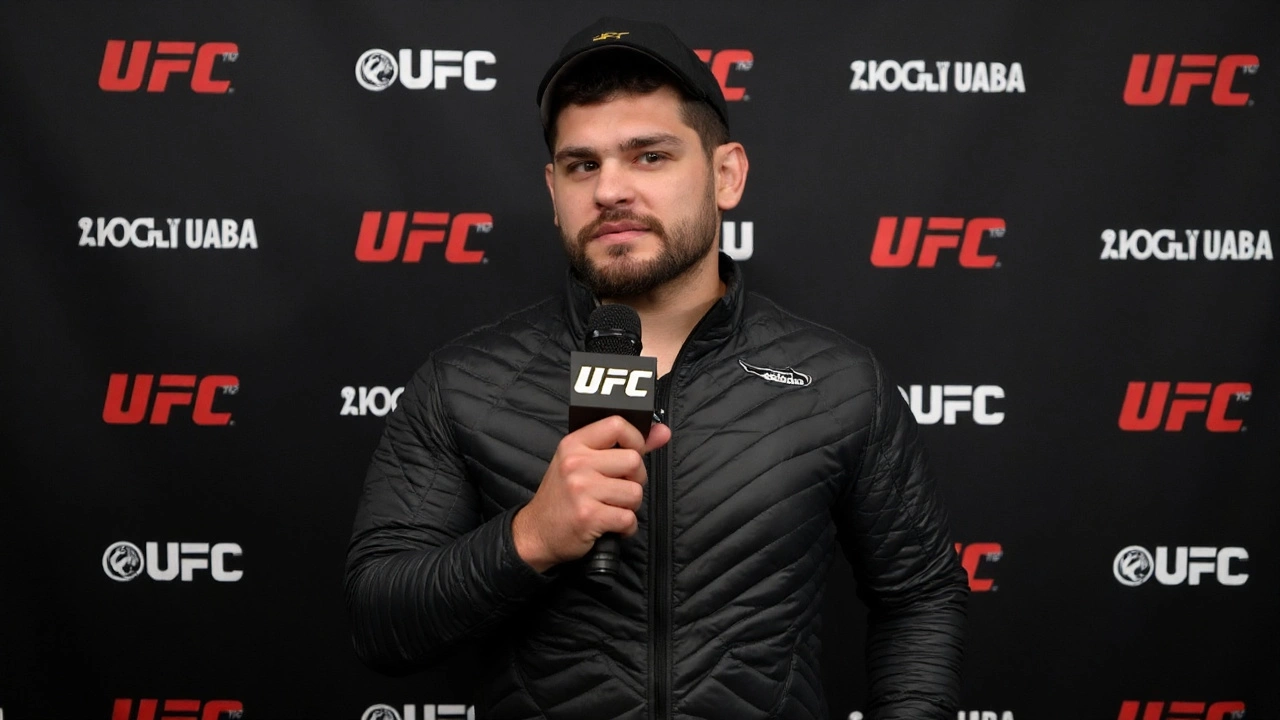The win and the weight miss
Kelvin Gastelum walked out of Noche UFC with a clear victory and a conflicted heart. The scorecards—30-27, 29-28, 29-28—were solid, the kind of unanimous nod that calms debate. But the story he told inside the cage cut the other way: he took the fight on four weeks’ notice, he didn’t make the contracted weight, and he felt that took shine off the result.
He owned it in the post-fight interview with Daniel Cormier. He said the timeline was tight, the cut didn’t happen, and he apologized directly to his opponent Dustin and his team. No excuses. Just an open admission that, yes, he got the win, but he missed on a basic part of the job.
The admission matters in a sport that treats the scale like a second opponent. When a fighter misses, the bout usually proceeds at a catchweight, the offender surrenders a percentage of the purse—often 20 to 30 percent—to the opponent, and the miss can cost bonus eligibility. Fans remember. Matchmakers remember. So do opponents who did make the limit.
Gastelum didn’t lean on drama. He thanked his camp at Fight Ready, shouted out manager Ali Hunter, and pointed to the people who carry him between fights—his mother, sister, family, and girlfriend. He also credited his faith, saying he wouldn’t be here without it. The tone wasn’t victory lap; it was relief, gratitude, and a bit of frustration rolled together.
About the matchup itself, he kept it respectful. He called Dustin dangerous, noted both men were coming off losses, and framed the night as a gut check. That tracks with his career arc: a veteran who’s fought elite names, taken tough assignments, and absorbed both the highs of headlining cards and the lows of rebuilding runs.
What we didn’t get was a flashy callout or a big promise. The message was simpler: thanks for the shot, sorry about the scale, glad to have delivered on fight night.

What it means for Gastelum’s path
Short-notice fights look heroic on posters and brutal on calendars. Four weeks is enough time to sharpen tactics and tighten conditioning, but it’s a squeeze for a serious cut—especially for a fighter who’s bounced between divisions. You can clean up diet and shed body fat, but the hardest part of a cut often happens in the final 7 to 10 days, when water manipulation runs the show. Compress that window, and the risk of a miss shoots up.
That’s the uncomfortable trade-off Gastelum faced. Take the fight, stay active, and risk the scale. Or pass, stay on the shelf, and watch opportunities slide to someone else. He chose to fight, owned the fallout, and then handled business in the cage. The win hits the ledger; the miss, too.
So what changes now? First, perception. When a fighter wins after missing weight, it can feel like a built-in advantage: more fluids, less depletion. Fair or not, that’s the conversation. Fans will cheer the grit and still side-eye the scales. Promoters will appreciate the short-notice save but quietly expect a clean weigh-in next time.
Second, money and bonuses. Fighters who miss weight are typically ineligible for performance awards, and the fine paid to the opponent takes a chunk of the purse. Even with a win, the night becomes more about course correction than celebration.
Third, the question of division. Gastelum’s career has zigzagged between welterweight and middleweight. Welterweight offers speed and reach challenges but demands sharper, riskier cuts. Middleweight eases the cut but brings thicker power and different matchups. If this miss came at the lower class, a return to middleweight will be the obvious talking point. If it came at middleweight, the focus shifts to timing, camp length, and nutrition rather than a divisional jump.
There’s also the plain reality that he’s still relevant. A unanimous decision on a spotlight card keeps him in the mix. He’s been here before—big wins, tough losses, reset, repeat—and he’s still a problem because he’s durable, composed, and experienced against upper-tier opponents. That track record buys trust, but it doesn’t excuse repeat issues on the scale. He knows it.
Zoom out, and Noche UFC did what it always aims to do: deliver a night with urgency. The event sits on the calendar as a celebration card, and that pressure tends to produce honest moments. Gastelum offered one. He didn’t try to spin it into perfection. He called it bittersweet and left it there.
There’s a tactical angle to this, too. Fighters who accept short-notice bookings often bank goodwill with the promotion. It can mean faster turnarounds, favorable placement on cards, and a bit more patience when things get messy. But that goodwill is fragile. You get credit for saving a matchup; you get dinged for missing weight. Both can be true at once.
For Dustin, the situation cuts both ways as well. He took the fight against a heavier opponent, showed up on weight, and pushed through. He gets the purse bump if the fine applied, and he shares the spotlight on a card that drew attention. He doesn’t get the win, and that stings, but he walked the line professionally.
From a health standpoint, the weight conversation isn’t going away. Combat sports are inching toward smarter protocols—more time between weigh-ins and fights, hydration checks in some organizations, tighter oversight of extreme cuts. The UFC has made tweaks around early weigh-ins and medical monitoring, but the culture of big cuts is stubborn. Nights like this are reminders that the math doesn’t always work on short notice.
What comes next is familiar: a debrief with coaches, a call with the manager, and a look at the calendar. Ideally, he takes a full camp, targets a weight he can hit consistently, and keeps the momentum. The win opens doors. A clean weigh-in next time steadies the ground under his feet.
If you’re reading the tea leaves for matchmaking, keep expectations modest. He didn’t call for a top-five name, and a step-up bout usually follows a clean buildup. A measured climb—one more opponent in that mid-tier, a co-main slot on a strong card—makes sense. If the promotion wants to test his ceiling again, it will hinge on the next scale reading as much as the last scorecards.
There was a human note to all of it. Thanking the coaching room matters because those are the people who monitor the cut, the sparring, and the mental traffic that comes with both. Thanking family matters because they ride the turbulence you don’t see. Crediting faith matters because it centers him when the margins get thin. Those aren’t throwaway lines; they’re the frame for why he keeps saying yes to big spots.
In the end, the ledger shows a win and a weight miss. Both truths will follow him into his next booking. If he hits the mark and performs, this night becomes a blip with a lesson. If not, it becomes a pattern. He sounded like a man determined to make sure it’s the former.
Key takeaways from Noche UFC for Gastelum and the division:
- A unanimous decision win resets his momentum after recent setbacks.
- The weight miss complicates the narrative and likely cost him bonus eligibility.
- Short-notice fights boost opportunity but squeeze the cut, especially for fighters moving between divisions.
- The next camp—and the next weigh-in—will shape whether this win builds a run or just stops a skid.
